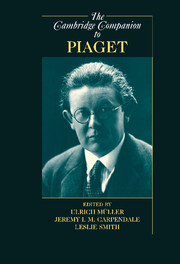Book contents
- Frontmatter
- 1 Introduction: Overview
- 2 The Historical Context Of Piaget’s Ideas
- 3 Piaget’s Developmental Epistemology
- 4 Piaget’s Biology
- 5 On the Concept(s) of the Social in Piaget
- 6 Piaget on Equilibration
- 7 Constructive Processes: Abstraction, Generalization, and Dialectics
- 8 Piaget and Method
- 9 Infancy
- 10 Childhood
- 11 Adolescence
- 12 Piaget’s Theory of Moral Development
- 13 Piaget’s Enduring Contribution to a Science of Consciousness
- 14 Piaget and Affectivity
- 15 Piaget’s Pedagogy
- 16 Piaget in the United States, 1925-1971
- 17 The Mind’s Staircase Revised
- 18 Dynamic Development: A Neo-Piagetian Approach
- Index
4 - Piaget’s Biology
Published online by Cambridge University Press: 28 March 2010
- Frontmatter
- 1 Introduction: Overview
- 2 The Historical Context Of Piaget’s Ideas
- 3 Piaget’s Developmental Epistemology
- 4 Piaget’s Biology
- 5 On the Concept(s) of the Social in Piaget
- 6 Piaget on Equilibration
- 7 Constructive Processes: Abstraction, Generalization, and Dialectics
- 8 Piaget and Method
- 9 Infancy
- 10 Childhood
- 11 Adolescence
- 12 Piaget’s Theory of Moral Development
- 13 Piaget’s Enduring Contribution to a Science of Consciousness
- 14 Piaget and Affectivity
- 15 Piaget’s Pedagogy
- 16 Piaget in the United States, 1925-1971
- 17 The Mind’s Staircase Revised
- 18 Dynamic Development: A Neo-Piagetian Approach
- Index
Summary
PIAGET AS BIOLOGIST AND PHILOSOPHER
Jean Piaget, who spent more than 50 years investigating how children learn and develop, is universally recognized as one of the world's great child psychologists. But for Piaget these studies were merely the means he used to understand the philosophical question that motivated him: What was the relationship between biology and knowledge? Or, to put it more fully, is there any connection between the relationship of biological organisms and their physical environment that parallels the relationship between human minds and their epistemological environment? The search for the connection between biology and knowledge motivated Piaget's work, and his years of careful study of children provided the material from which he could, hopefully, answer his question. In other words, the study of children was undertaken specifically to bridge the gap between biology and knowledge. What Piaget uncovered after years of arduous toil was that the parallels between biological organisms in physical environments and human minds in epistemological environments were striking. Eventually his theory and the evidence led him to propose that there are functional invariants - organization, adaptation, assimilation, accommodation, and equilibration - that exist in both realms.
- Type
- Chapter
- Information
- The Cambridge Companion to Piaget , pp. 94 - 109Publisher: Cambridge University PressPrint publication year: 2009
- 5
- Cited by



